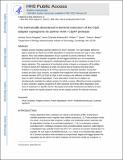The Intrinsically Disordered N-terminal Extension of the ClpS Adaptor Reprograms Its Partner AAA + ClpAP Protease
Author(s)
Torres-Delgado, Amaris; Kotamarthi, Hema Chandra; Sauer, Robert T; Baker, Tania A
DownloadAccepted version (1.109Mb)
Publisher with Creative Commons License
Publisher with Creative Commons License
Creative Commons Attribution
Terms of use
Metadata
Show full item recordAbstract
© 2020 Adaptor proteins modulate substrate selection by AAA + proteases. The ClpS adaptor delivers N-degron substrates to ClpAP but inhibits degradation of substrates bearing ssrA tags or other related degrons. How ClpS inhibits degradation of such substrates is poorly understood. Here, we demonstrate that ClpS impedes recognition of ssrA-tagged substrates by a non-competitive mechanism and also slows subsequent unfolding/translocation of these substrates as well as of N-degron substrates. This suppression of mechanical activity is largely a consequence of the ability of ClpS to repress ATP hydrolysis by ClpA, but several lines of evidence show that ClpS's inhibition of substrate binding and its ATPase repression are separable activities. Using ClpS mutants and ClpS-ClpA chimeras, we establish that engagement of the intrinsically disordered N-terminal extension of ClpS by ClpA is both necessary and sufficient to inhibit multiple steps of ClpAP-catalyzed degradation. These observations reveal how an adaptor can simultaneously modulate the catalytic activity of a AAA + enzyme, efficiently promote recognition of some substrates, suppress recognition of other substrates, and thereby affect degradation of its menu of substrates in a specific manner. We propose that similar mechanisms are likely to be used by other adaptors to regulate substrate choice and the catalytic activity of molecular machines.
Date issued
2020Department
Massachusetts Institute of Technology. Department of BiologyJournal
Journal of Molecular Biology
Publisher
Elsevier BV